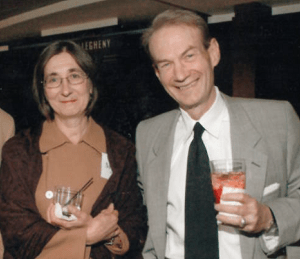The Challenge: A Frail Heart
Phil Rostek has a special fondness for Oakland. He studied the art and architecture of this renowned Pittsburgh neighborhood as a grad student at Carnegie Mellon University.
And he and his wife have lived nearby in Shadyside for many years.
In 2008 — when Phil needed a heart transplant at UPMC Presbyterian — he felt like he was right where he belonged.
“It made sense, like this was where I was supposed to be.” Phil says. “Eventually, they took me up Cardiac Hill and saved me.”
As a teen, Phil learned he had a heart murmur — an abnormal heart sound — during a routine physical for his golf team.
Heart murmurs can be harmless — causing no symptoms and needing no treatment — or abnormal, due to an underlying heart condition. The cause of Phil’s heart murmur was mitral valve prolapse.
Mitral valve prolapse is a disease in which the heart’s mitral valve has extra tissue and can't close properly. This causes blood to leak back into the heart.
Over time, a leaking mitral valve can lead to major problems, like heart attack or heart failure.
Phil remembers thinking — even back in college — that his frail health might keep him from having a long life. He developed high blood pressure, but treated it successfully with drugs for many years.
In 1999 — at the age of 50 — Phil suffered a heart attack and had quadruple bypass surgery.
He received a defibrillator to keep his heart beating in a normal rhythm, but his heart was so weak that doctors believed he might only have another 10 years to live.
The Path to the UPMC Heart Transplant Program
About nine years after his bypass surgery, Phil’s health declined. He had diabetes, was severely short of breath, and needed a pacemaker.
During his pacemaker implant surgery, Phil went into cardiac arrest.
Although doctors revived him, he remained unconscious for three days before waking and transferring to UPMC Presbyterian.
“I remember looking out of the back of the ambulance at Oakland as they drove me up the hill to UPMC Presbyterian and thinking, this is right where I need to be,” Phil says.
Phil’s cardiologist, Michael Mathier, MD, head of the Section of Heart Failure and Pulmonary Hypertension at UPMC’s Heart and Vascular Institute, believed Phil’s best option for treatment was a heart transplant.
He had a series of tests and was approved for the heart transplant list.
“Every one of the doctors had a quiet confidence that put me at ease,” Phil says. “They were all so different from one another, and yet so professional, capable, and compassionate. That confidence and compassion took away my fears.”
The Solution: A Heart Transplant
In June 2008, Phil had heart transplant surgery.
Though his recovery took some time — he left the hospital about two months after the surgery — he says the people at UPMC helped him each step of the way.
Phil recalls countless stories about the doctors, nurses, technologists — and an unforgettably kind woman who took his dinner order one evening before his transplant — all of whom made a huge difference not only in his care, but in his outlook and his recovery.
“I’ll never forget these people,” he says. “It felt like we were all in this together.”
Phil's treatment and results may not be representative of similar cases.
Read more heart transplant patient stories
Learn More About Heart Failure and Heart Health
UPMC Health Library:
UPMC HealthBeat Blog:
















